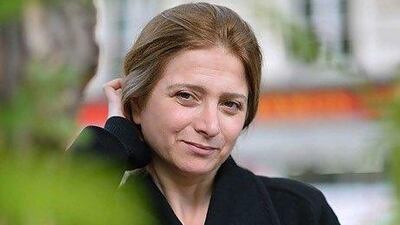In a week where The National reported that some neighbourhoods in Damascus had turned into ghost towns as residents fled for their lives, and the UAE Foreign Minister Sheikh Abdullah bin Zayed voiced concerns that the situation in Syria has escalated because the recommendations of the Arab League have been ignored, the award of another literary prize might have seemed completely irrelevant. But when the author Samar Yazbek received the International Writer of Courage Award 2012 last week for her unflinching diary of the early days of the Syrian uprising - A Woman in the Crossfire - there was the real sense that books are still capable of increasing awareness and highlighting injustice. Maybe even of effecting change.
"Obviously the award means a lot personally, but it's more important as a reflection on how the situation in Syria is perceived," she says, a few days after accepting the award. "I have been persistent in representing the first four months of the revolution honestly, and I tried to report the reality as I witnessed it, to refute the lies presented by the regime's media."
As a neat summation of A Woman in the Crossfire, which last month The National called "the definitive account of the first 100 days of a once-peaceful uprising", her description is spot on. But the reality is harrowing. As a high-profile journalist, her criticism was troublesome for the regime, and in the book she is arrested, punched by a police officer, and threatened over and over again for daring to voice her opposition. Her family disowns her and her teenage daughter pleads with her to stop. In the end Yazbek flees to Paris. "I don't know if I was brave, I just felt it was a duty to publish this book, a duty connected to the ideals of justice and bearing witness to the truth," she says. "That is the most important role an intellectual or a writer should play, and to be honest, that gives us meaning. But I had to leave Syria to be able to publish it, while people back home are now paying with their lives to document the shelling. What I have done is actually very basic and can't be compared to their actions."
Yazbek is being slightly modest. Although she effectively lives in exile, she still sneaks back into Syria in secrecy to make sense of the situation. "I wouldn't say I live in exile - I don't feel I belong - but the internet has made things much easier for me," she says. But what she's seen since writing A Woman in the Crossfire hasn't made her any more hopeful for the future.
"I'm afraid we are in a difficult and complex situation," she says. "The regime describes it as a civil war to find a justification for murdering so many innocent people, and to distort the revolution's ethical and peaceful ideals. They have managed to force the peaceful popular movement to adopt an armed struggle and, as no agreements have been struck that suit the interests of all international players, as long as Assad is in power the revolution will continue. I am afraid the longer things drag on the more we face the increasing risk of sectarianism and fundamentalism."
As for Yazbek, she now joins a distinguished band of award-winning war reporters. A strange accolade, perhaps, for a novelist who wasn't even sure whether she'd publish these very personal diaries in the first place and cites the famous 10th-century writer Abu Hayyan Al-Tawhidi, Greek mythology and Virginia Woolf as key influences. But it's the writing that hits home, born of a clear desire that one day, Yazbek can return home herself, without fear, in a country of peace.
* Woman in the Crossfire: Diaries of the Syrian Revolution is out now in Arabic and English

